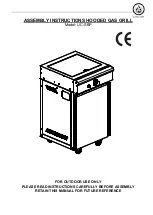
S
A
F
E
T
Y
3
3
FOR YOUR SAFETY:
DO NOT STORE OR USE PETROL OR
OTHER FLAMMABLE VAPOURS AND
LIQUIDS IN THE VICINITY OF THIS OR
ANY OTHER APPLIANCE.
DO NOT STORE EMPTY OR FULL SPARE
GAS CYLINDERS IN STORAGE
COMPARTMENT OR NEAR THIS OR ANY
OTHER APPLIANCE.
KEEP THE GAS HOSE AWAY FROM HOT
SURFACES. PROTECT GAS HOSE FROM
DRIPPING GREASE.
AVOID UNNECESSARY TWISTING OF
HOSE. VISUALLY INSPECT HOSE PRIOR
TO EACH USE FOR CUTS, CRACKS,
EXCESSIVE WEAR OR OTHER DAMAGE.
REPLACE HOSE, IF NECESSARY.
NEVER TEST FOR GAS LEAKS WITH A LIT
MATCH OR OPEN FLAME.
NEVER LIGHT BARBECUE WITH HOOD
CLOSED.
NEVER LEAN OVER COOKING
SURFACE WHILE LIGHTING BARBECUE.
USE GOOD QUALITY INSULATED OVEN
MITTS WHEN OPERATING BARBECUE.
NEVER ALTER OR MODIFY THE
REGULATOR OR GAS SUPPLY ASSEMBLY.
THIS BARBECUE MUST NOT BE USED
INDOORS.
DANGER – IF YOU SMELL OR HEAR THE
HISS OF ESCAPING GAS FROM THE GAS
CYLINDER:
KEEP CLEAR OF THE GAS CYLINDER.
DO NOT ATTEMPT TO CORRECT THE
PROBLEM YOURSELF.
CALL YOUR FIRE DEPARTMENT
(DO NOT MAKE THE CALL FROM
ANYWHERE NEAR THE GAS CYLINDER –
YOUR TELEPHONE IS AN ELECTRICAL
DEVICE, AND COULD PRODUCE A SPARK).
READ CAREFULLY BEFORE
ASSEMBLING AND OPERATING
YOUR BARBECUE.
NEVER CONNECT AN UNREGULATED
GAS CYLINDER TO YOUR BARBECUE.
NEVER STORE YOUR GAS
CYLINDER INDOORS.
FOR STORAGE AND CYLINDER
EXCHANGE, DISCONNECT HOSE AT
THE CYLINDER ONLY – DO NOT
DISCONNECT HOSE FROM
THE APPLIANCE.
DO NOT use your barbecue in garages, porches, breezeways,
sheds or other enclosed areas. Your barbecue is to be used
OUTDOORS ONLY. Refer to page 5. The barbecue is not
intended to be installed in or on recreational vehicles
and/or boats and should not be placed under any surface
that will burn. Do not obstruct the flow of combustion and
ventilation air around the barbecue while in use.
LOCATION OF YOUR BARBECUE
Keep children away from barbecue during use and until
barbecue has cooled after you are finished. Do not allow
children to operate barbecue, or to swing on handle.
PROTECT CHILDREN
NEVER TEST FOR LEAKS WITH AN OPEN FLAME.
Prior to first use, and at the beginning of each new season
(or, if using bottled gas, whenever gas cylinder is changed)
, you
must check for gas leaks.
Follow these steps:
1.
Make soap solution by mixing one part liquid detergent
and one part water.
2.
Turn burner control(s) to
‘OFF’
, then turn on gas at
source.
3.
Apply the soap solution to all visible and accessible
gas connections. Bubbles will appear in the soap
solution if connections are not properly sealed.
Tighten or rectify as necessary.
4.
If you have a gas leak you cannot rectify, turn off the
gas at the source, disconnect hose from barbecue and
immediately contact your place of purchase for
assistance.
Refer to page back cover.
CHECKING FOR GAS LEAKS
The gas cylinder should be filled by a reputable gas dealer,
or exchanged at a reputable cylinder exchange outlet. Gas
cylinders should be visually inspected and requalified
periodically.
Always keep gas cylinder in an upright position.
Always close the cylinder valve when the barbecue is not in use.
Do not subject gas cylinder to excessive heat.
If you store your barbecue indoors, ALWAYS disconnect
and remove gas cylinder FIRST, and store gas cylinder safely
outside. Gas cylinders must be stored outdoors in a well
ventilated area out of reach of children, and must not be
stored in a building, garage or any other enclosed area.
This is a low pressure barbecue and must only be used with
the hose and regulator supplied.
Your barbecue is designed for use with a 9 kg gas
cylinder. Ensure gas cylinder conforms to Australian
standards.
DO NOT CONNECT YOUR BARBECUE TO A GAS
CYLINDER LESS THAN OR EXCEEDING THIS CAPACITY.
GAS CYLINDER USE AND SAFETY
IF YOU SMELL GAS:
1. SHUT OFF GAS TO THE APPLIANCE
AT ITS SOURCE, IF POSSIBLE.
2. EXTINGUISH ANY OPEN FLAME.
3. OPEN HOOD.
4. PERFORM GAS LEAK CHECK
PROCEDURE.
5. IF ODOUR CONTINUES,
IMMEDIATELY CALL YOUR GAS
SUPPLIER OR FIRE DEPARTMENT.




































